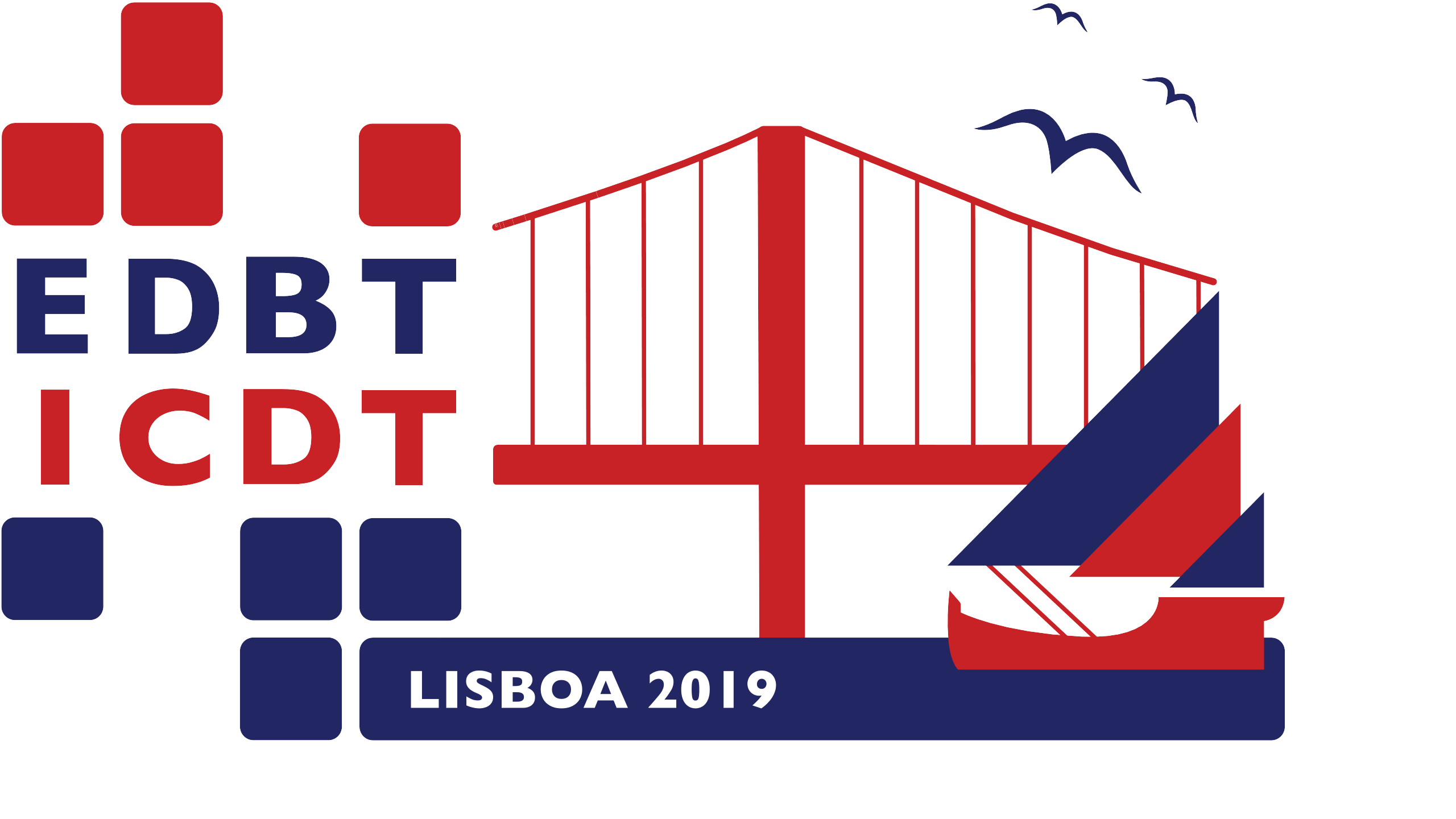General Information
- EDBT/ICDT 2019
- News
- Venue
- Registration
- Accommodation
- Social Events
- Event Photos
- Event Feedback
- Contacts
Program
- Program Overview
- Detailed Program
- Workshop Program
- Invited Keynotes
- Invited ICDT Tutorial
- EDBT/ICDT Awards
- Tutorials
- Research Challenges
- Guidelines for Presenters
- Workshops
- Accepted Papers
Co-located Events
Open Proceedings
Organization
Calls
Invited Keynotes
We are very pleased to announce the EDBT/ICDT 2019 invited keynote speakers.
Learning Models over Relational Databases (Slides)
by Dan Olteanu
Abstract: In this talk, I will make the case for a first-principles approach to machine learning over relational databases that exploits recent development in database systems and theory.
The input to learning classification and regression models is defined by feature extraction queries over relational databases. The mainstream approach to learning over relational data is to materialize the training dataset, export it out of the database, and then learn over it using statistical software packages. These three steps are expensive and unnecessary. Instead, one can cast the machine learning problem as a database problem by decomposing the learning task into a batch of aggregates over the feature extraction query and by computing this batch over the input database.
Ongoing results show that the performance of this approach benefits tremendously from structural properties of the relational data and of the feature extraction query; such properties may be algebraic (semi-ring), combinatorial (hypertree width), or statistical (sampling). It also benefits from factorized query evaluation and query compilation. For a variety of models, including factorization machines, decision trees, and support vector machines, this approach may come with lower computational complexity than the materialization of the training dataset used by the
mainstream approach. This translates to several orders-of-magnitude speed-up over state-of-the-art systems such as TensorFlow, R, Scikit-learn, and mlpack. While these results are promising, there is much more awaiting to be discovered.
This work is part of the FDB project and based on
collaboration with Maximilian Schleich (Oxford), Mahmoud Abo-Khamis, Ryan Curtin, Hung Q. Ngo (RelationalAI), Ben Moseley (CMU), and XuanLong Nguyen (Michigan).
 Dan Olteanu is Professor of Computer Science at the University of Oxford and Computer Scientist at RelationalAI. He received his PhD from the University of Munich in 2005. He spends his time understanding hard computational challenges and designing simple and scalable solutions towards these challenges. He has published over 70 papers in the areas of database systems, AI, and theoretical computer science, contributing to XML query processing, incomplete information and probabilistic databases, factorised databases, scalable and incremental in-database optimisation, and the commercial systems LogicBlox and RelationalAI. He co-authored the book « Probabilistic Databases » (2011). He has served as associate editor for PVLDB and IEEE TKDE, as track chair for IEEE ICDE’15, group leader for ACM SIGMOD’15, vice chair for ACM SIGMOD’17, and co-chair for AMW’18, and he is currently serving as associate editor for ACM TODS. He is the recipient of an ERC Consolidator grant (2016) and an Oxford Outstanding Teaching award (2009).
Dan Olteanu is Professor of Computer Science at the University of Oxford and Computer Scientist at RelationalAI. He received his PhD from the University of Munich in 2005. He spends his time understanding hard computational challenges and designing simple and scalable solutions towards these challenges. He has published over 70 papers in the areas of database systems, AI, and theoretical computer science, contributing to XML query processing, incomplete information and probabilistic databases, factorised databases, scalable and incremental in-database optimisation, and the commercial systems LogicBlox and RelationalAI. He co-authored the book « Probabilistic Databases » (2011). He has served as associate editor for PVLDB and IEEE TKDE, as track chair for IEEE ICDE’15, group leader for ACM SIGMOD’15, vice chair for ACM SIGMOD’17, and co-chair for AMW’18, and he is currently serving as associate editor for ACM TODS. He is the recipient of an ERC Consolidator grant (2016) and an Oxford Outstanding Teaching award (2009).
Journalistic Dataspaces: Data Management for Journalism and Fact-Checking
by Ioana Manolescu
Abstract: Modern societies crucially rely on the availability of free media. While any citizen has today access to the necessary tools to publish content and debate, the best standards for reliable, verified reporting and for well-structured debates are still held by professional journalists. Historically confined to newsrooms and performed before publication, verification of claims (aka fact-checking) has now become a very visible part of journalists' activity; the importance of some topics under discussion (e.g., large-scale pollution or the national economy) has also attracted fact-checkers outside the journalism industry, such as scientists, NGOs etc. In this talk, I will outline a vision of Journalistic Dataspaces, as an environment and set of tools that should support journalists and/or fact-checkers by means of digital content management. This draws upon the recent years of collaboration with journalists from French media, notably Le Monde's fact-checking team "Les Décodeurs" and Ouest France, a large regional newspaper, as well as many academic colleagues. I will highlight the common needs of fact-checking and modern ("data") journalism, show how existing tools from the database, information retrieval, knowledge representation and natural language processing can help realize this vision. I will also discuss the main technical and organizational challenges toward realizing this vision. Most of this work is part of the ANR ContentCheck project.
 Ioana Manolescu is the lead of the CEDAR team, joint between Inria Saclay and the LIX lab (UMR 7161) of Ecole polytechnique, in France. The CEDAR team research focuses on rich data analytics at cloud scale. She is a member of the PVLDB Endowment Board of Trustees, and a co-president of the ACM SIGMOD Jim Gray PhD dissertation committee. Recently, she has been a general chair of the IEEE ICDE 2018 conference, an associate editor for PVLDB 2017 and 2018, and the program chair of SSDBBM 2016. She has co-authored more than 130 articles in international journals and conferences, and contributed to several books. Her main research interests include data models and algorithms for computational fact-checking, performance optimizations for semistructured data and the Semantic Web, and distributed architectures for complex large data.
Ioana Manolescu is the lead of the CEDAR team, joint between Inria Saclay and the LIX lab (UMR 7161) of Ecole polytechnique, in France. The CEDAR team research focuses on rich data analytics at cloud scale. She is a member of the PVLDB Endowment Board of Trustees, and a co-president of the ACM SIGMOD Jim Gray PhD dissertation committee. Recently, she has been a general chair of the IEEE ICDE 2018 conference, an associate editor for PVLDB 2017 and 2018, and the program chair of SSDBBM 2016. She has co-authored more than 130 articles in international journals and conferences, and contributed to several books. Her main research interests include data models and algorithms for computational fact-checking, performance optimizations for semistructured data and the Semantic Web, and distributed architectures for complex large data.
The Power of Relational Learning
by Lise Getoor
Abstract: We live in a richly interconnected world and, not surprisingly, we generate richly interconnected data. From smart cities to social media to financial networks to biological networks, data is relational. While database theory is built on strong relational foundations, the same is not true for machine learning. The majority of machine learning methods flatten data into a single table before performing any processing. Further, database theory is also built on a bedrock of declarative representations. The same is not true for machine learning, in particular deep learning, which results in black-box, uninterpretable and unexplainable models. In this talk, I will introduce the field of statistical relational learning, an alternative machine learning approach based on declarative relational representations paired with probabilistic models. I’ll describe our work on probabilistic soft logic, a probabilistic programming language that is ideally suited to richly connected, noisy data. Our recent results show that by building on state-of-the-art optimization methods in a distributed implementation, we can solve very large relational learning problems orders of magnitude faster than existing approaches.
 Lise Getoor is a professor in the Computer Science Department at the University of California, Santa Cruz and director of the UCSC D3 Data Science Research Center. Her research areas include machine learning, data integration and reasoning under uncertainty. She has over 250 publications and extensive experience with machine learning and probabilistic modeling methods for graph and network data. She is a Fellow of the Association for Artificial Intelligence, and has served as an elected board member of the International Machine Learning Society, served on the board of the Computing Research Association (CRA), and was co-chair for ICML 2011. She is a recipient of an NSF Career Award and twelve best paper and best student paper awards. She received her PhD from Stanford University in 2001, her MS from UC Berkeley, and her BS from UC Santa Barbara, and was a professor in the Computer Science Department at the University of Maryland, College Park from 2001-2013.
Lise Getoor is a professor in the Computer Science Department at the University of California, Santa Cruz and director of the UCSC D3 Data Science Research Center. Her research areas include machine learning, data integration and reasoning under uncertainty. She has over 250 publications and extensive experience with machine learning and probabilistic modeling methods for graph and network data. She is a Fellow of the Association for Artificial Intelligence, and has served as an elected board member of the International Machine Learning Society, served on the board of the Computing Research Association (CRA), and was co-chair for ICML 2011. She is a recipient of an NSF Career Award and twelve best paper and best student paper awards. She received her PhD from Stanford University in 2001, her MS from UC Berkeley, and her BS from UC Santa Barbara, and was a professor in the Computer Science Department at the University of Maryland, College Park from 2001-2013.
Subjective databases: Enabling Search by Experience (Slides)
by Wang-Chiew Tan
Abstract: Today's online shopping systems enable consumers to sift through a vast amount of information by manipulating combinations of predefined filters. These filters, such as travel dates, price range, and location, are objective attributes that lead to an indisputable set of answers. However, we show that users' search criteria are often subjective and experientially expressed. Hence, to provide consumers with an enhanced search experience, online shopping systems should directly support both subjective and objective search. I will describe how this is done in an experiential search engine that we are currently developing at Megagon Labs; by harnessing information "outside the box", in the text of online reviews or social media, views, and interpreting subjective queries.
 Wang-Chiew Tan leads the research efforts at Megagon Labs. Prior to joining Megagon Labs, she was a professor of Computer Science at the University of California, Santa Cruz and she also spent two years at IBM Almaden Research Center. Her research interests include data provenance, data integration, and very recently, natural language processing. She is the recipient of an NSF CAREER award, a Google Faculty Award, and an IBM Faculty Award. She is a co-recipient of the 2014 ACM PODS Alberto O. Mendelzon Test-of-Time Award and a co-recipient of the 2018 ICDT Test-of-Time Award. She was the program committee chair of ICDT 2013 and PODS 2016. She is currently on the VLDB Board of Trustees and a Fellow of the ACM.
Wang-Chiew Tan leads the research efforts at Megagon Labs. Prior to joining Megagon Labs, she was a professor of Computer Science at the University of California, Santa Cruz and she also spent two years at IBM Almaden Research Center. Her research interests include data provenance, data integration, and very recently, natural language processing. She is the recipient of an NSF CAREER award, a Google Faculty Award, and an IBM Faculty Award. She is a co-recipient of the 2014 ACM PODS Alberto O. Mendelzon Test-of-Time Award and a co-recipient of the 2018 ICDT Test-of-Time Award. She was the program committee chair of ICDT 2013 and PODS 2016. She is currently on the VLDB Board of Trustees and a Fellow of the ACM.


